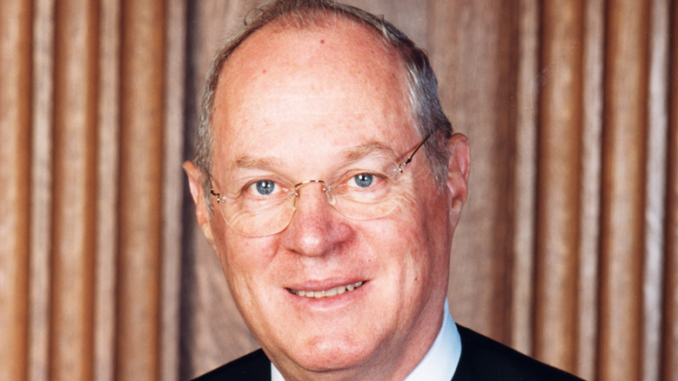
An era of Supreme Court jurisprudence is ending. With Associate Justice Anthony Kennedy’s announced retirement effective July 31, 2018 (thenewsblender.com), the bridge between the Supreme Court’s two poles in judicial thinking will cease to exist.
Even as outsiders who sought to bend the nation’s highest court to their preferred ideological ends often lamented Justice Kennedy’s rulings, he commanded the respect of all of his colleagues. In response to his retirement announcement, his peers on the Court described him using words such as “dignity,” “independence,” “integrity,” “thoughtful,” and “wisdom.” (SCOTUSblog.org) These adjectives highlight the enormous contribution Kennedy made during his three decades of service and the esteem in which his colleagues hold him.
At a time when the Legislative and Executive branches have become so politically polarized that dysfunction is now their normal condition, the Supreme Court continued to function effectively, competently, and occasionally brilliantly as a guardian of the Constitution and its protections. Compared to the Congress and the Presidency, the Court seemed almost immune to the rising political pressures all around it.
During his tenure, Kennedy wrote the majority opinion for numerous landmark cases. Despite the ideological fallout that followed, some of those opinions will likely stand the test of time. Perhaps Fisher v. University of Texas (2013) (supreme.justia.com) provides as good an example as there is of Kennedy’s measured and reasoned approach from the Bench. The Fisher decision concerned the often contentious legal struggle over affirmative action and equality under the law. Kennedy drew from Justice Lewis Powell’s decision in the University of California v. Bakke (1978) case to explain the foundation on which the Court’s decision would rest 35 years later. He explained:
The principle of equal protection admits no “artificial line of a ‘two- class theory’ ” that “permits the recognition of special wards entitled to a degree of protection greater than that accorded others.” …Any racial classification must meet strict scrutiny, for when government decisions “touch upon an individual’s race or ethnic background, he is entitled to a judicial determination that the burden he is asked to bear on that basis is precisely tailored to serve a compelling governmental interest.”
…Justice Powell identified one compelling interest that could justify the consideration of race: the interest in the educational benefits that flow from a diverse student body. Redressing past discrimination could not serve as a compelling interest, because a university’s “broad mission [of] education” is incompatible with making the “judicial, legislative, or administrative findings of constitutional or statutory violations” necessary to justify remedial racial classification…
The attainment of a diverse student body, by contrast, serves values beyond race alone, including enhanced class-room dialogue and the lessening of racial isolation and stereotypes. The academic mission of a university is “a special concern of the First Amendment.”
Kennedy then drew upon Sandra Day O’Connor’s majority opinion in Grutter v. Bollinger (1997) and Chief Justice Rehnquist’s majority opinion in Gratz v. Bollinger (2003) to reinforce the criteria by which the Fifth Circuit’s Court of Appeals’ decision would be evaluated. Kennedy explained:
Race may not be considered unless the admissions process can withstand strict scrutiny. “Nothing in Justice Powell’s opinion in Bakke signaled that a university may employ whatever means it desires to achieve the stated goal of diversity without regard to the limits imposed by our strict scrutiny analysis.” …“To be narrowly tailored, a race-conscious admissions program cannot use a quota system,” …but instead must “remain flexible enough to ensure that each applicant is evaluated as an individual and not in a way that makes an applicant’s race or ethnicity the defining feature of his or her application…
Those criteria having been set forth, Kennedy concluded:
Strict scrutiny must not be “ ‘strict in theory, but fatal in fact,’ ” …But the opposite is also true. Strict scrutiny must not be strict in theory but feeble in fact. In order for judicial review to be meaningful, a university must make a showing that its plan is narrowly tailored to achieve the only interest that this Court has approved in this context: the benefits of a student body diversity that “encompasses a . . . broa[d] array of qualifications and characteristics of which racial or ethnic origin is but a single though important element.” …The judgment of the Court of Appeals is vacated, and the case is remanded for further proceedings consistent with this opinion.
Although Kennedy was not an Originalist, his jurisprudence was built on the idea that the Constitution protected individual liberty and that it was the Supreme Court’s role to safeguard that liberty (Frank J. Colucci, Justice Kennedy’s Jurisprudence, Lawrence, KS: University Press of Kansas, 2009). Such thinking is far from detached from the intent of the nation’s Founders. Indeed, in Federalist No. 51 (the Avalon Project), James Madison wrote:
In a free government the security for civil rights must be the same as that for religious rights… Justice is the end of government. It is the end of civil society. It ever has been and ever will be pursued until it be obtained, or until liberty be lost in the pursuit.
Kennedy’s legacy will be one of promoting the “security of civil rights” in the pursuit of justice. Even as it drove various partisan and ideological elements batty, his coherent application of legal principles is the measure of a judge who did his part to uphold the integrity of the rule of law.
In his The Tempting of America (New York: A Touchstone Book, 1990), Judge Robert H. Bork explained:
The democratic integrity of law, however, depends entirely upon the degree to which its processes are legitimate. A judge who announces a decision must be able to demonstrate that he began from recognized legal principles and reasoned in an intellectually coherent and politically neutral way to his result. Those who would politicize the law offer the public, and the judiciary, the temptation of results without regard to democratic legitimacy.
Justice Kennedy met that test. The nation could have done far worse.
